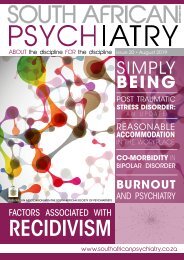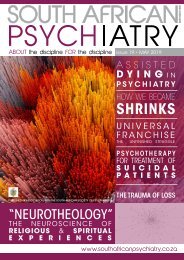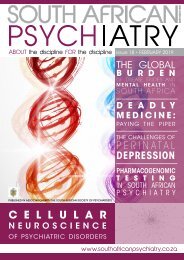South African Psychiatry - November 2018
South African Psychiatry - November 2018
South African Psychiatry - November 2018
You also want an ePaper? Increase the reach of your titles
YUMPU automatically turns print PDFs into web optimized ePapers that Google loves.
ORIGINAL<br />
focused on the efficacy of non-pharmacological<br />
interventions for reducing aggression in severe<br />
mental illness: the best interventions were cognitive<br />
behavioural therapy (CBT) and modified reasoning<br />
and rehabilitation (R&R), a cognitive skills programme<br />
which aims to reduce recidivism in offenders. The<br />
positive results which resulted from the EAP study<br />
were acknowledged, with the comment that it is an<br />
impractical choice for most psychiatric units 16 .<br />
In conclusion, despite a burgeoning literature, there<br />
is currently little evidence for the effectiveness of<br />
EAP in broad psychiatric populations, and this is<br />
because of poorly designed studies which lack<br />
methodological rigour. While there is also scant<br />
evidence for its effectiveness in severe mental illness<br />
specifically, there are suggestions that it may be<br />
effective in reducing aggression and violence. This,<br />
together with findings supportive of behavioural<br />
changes in children and adolescents, suggests<br />
that EAP may have unique benefits for a forensic<br />
psychiatric population, in which aggression and<br />
violence are recurring problems.<br />
THE VALKENBERG HOSPITAL EAP<br />
FORENSIC PROJECT<br />
Four EAP programmes have taken place at<br />
Valkenberg Hospital’s forensic unit since 2015, each<br />
occurring annually. The first three were each of eight<br />
weeks duration, and at the time of writing a fourth<br />
and longer, twelve-week programme had just been<br />
completed at the unit.<br />
THE FORENSIC MENTAL HEALTH UNIT AT<br />
VALKENBERG HOSPITAL (VBH) TREATS<br />
AND REHABILITATES PEOPLE WHO HAVE<br />
COMMITTED OFFENCES AND WHO<br />
HAVE BEEN ASSESSED AS NOT HAVING<br />
CRIMINAL CAPACITY FOR THEIR ACTIONS,<br />
AS THEY WERE MENTALLY ILL AT THE TIME<br />
OF COMMITTING THESE OFFENCES.<br />
Under <strong>South</strong> <strong>African</strong> law they are required, by the<br />
justice system, to undergo rehabilitation as inpatients<br />
in psychiatric hospitals. The illnesses that are mostly<br />
diagnosed in these patients (who are classified<br />
under <strong>South</strong> <strong>African</strong> law as ‘state patients’) include<br />
severe psychiatric illnesses such as schizophrenia<br />
and mood disorders, and there are often comorbid<br />
conditions present, including personality disorders<br />
and substance abuse. Only male state patients are<br />
accommodated at Valkenberg Hospital; female<br />
state patients, who are far fewer in number, are<br />
rehabilitated at Lentegeur Hospital.<br />
State patients are treated for extended periods<br />
of time (months to years) and are thus ideally<br />
suited to benefit from prolonged interventions,<br />
including equine assisted therapy programmes.<br />
The patients are actively treated for psychosis<br />
during the early phase of their rehabilitation, after<br />
which they are provided opportunities to engage<br />
in more psychologically and occupationally based<br />
rehabilitative work.<br />
Over and above pure mental illness, the<br />
psychopathological problems that are present in a<br />
forensic population, and the treatment interventions<br />
that are required to address them, are complex. As<br />
mentioned, disorders of personality, especially of<br />
the cluster B type, and including psychopathy, are<br />
frequently present. In addition, some patients have<br />
varying degrees of intellectual disability. Aggressive<br />
and recurrent behavioural disturbances are<br />
habitually present in forensic environments and are<br />
worsened by a high prevalence of substance abuse,<br />
which also causes relapse of mental illness.<br />
STATE PATIENTS FREQUENTLY FEEL<br />
MARGINALISED AND STIGMATISED BY<br />
THEIR FAMILIES AND COMMUNITIES,<br />
AND BY SOCIETY AT LARGE, NOT ONLY<br />
BECAUSE THEY HAVE MENTAL ILLNESSES,<br />
BUT ALSO BECAUSE THEY HAVE<br />
COMMITTED OFFENCES. SHAME, GUILT<br />
AND REMORSE, WHEN THEY DO OCCUR,<br />
ARE SELDOM ARTICULATED. MOST STATE<br />
PATIENTS STRUGGLE TO EXPRESS THESE<br />
FEELINGS, LET ALONE WORK THROUGH<br />
THEM WITH ANY DEGREE OF SUCCESS,<br />
AND DEFENSIVE MECHANISMS,<br />
INCLUDING DENIAL AND AVOIDANCE,<br />
ARE COMMON.<br />
Despite these therapeutic obstacles, the forensic<br />
unit’s therapeutic ethos is aligned with the<br />
principles of the recovery model, and it constantly<br />
strives to engender within state patients the<br />
model’s four domains of hope, positive self-identity,<br />
meaning in life and personal responsibility 19 . In<br />
addition to conventional pharmacological and<br />
psychotherapeutic interventions, and extensive<br />
occupational therapy programmes, the unit<br />
offers additional interventions such as pottery, art<br />
and music sessions. All of these interventions are<br />
creative and innovative, facilitate participation in<br />
group therapeutic activities, engage clients in a<br />
physical manner, and potentially enable access to<br />
psychological material in non-verbal ways. When<br />
the opportunity to work with equines presented<br />
itself to the unit, it was welcomed as an additional<br />
intervention which shared these characteristics.<br />
In addition, and very fortunately for Valkenberg<br />
Hospital, the intervention was considered to be a<br />
practical and accessible one, as the hospital is<br />
immediately adjacent to the Oude Molen Eco-<br />
Village, where there is a stable and horses. The<br />
horses that are accommodated and cared for at<br />
the stable are mostly rescued horses, and take part<br />
in community equestrian events, including horseriding<br />
lessons. The owner of the horses is supportive<br />
of equine assisted therapy and has readily allowed<br />
the unit to make use of the stable’s horses.<br />
SOUTH AFRICAN PSYCHIATRY ISSUE 17 <strong>2018</strong> * 11

















